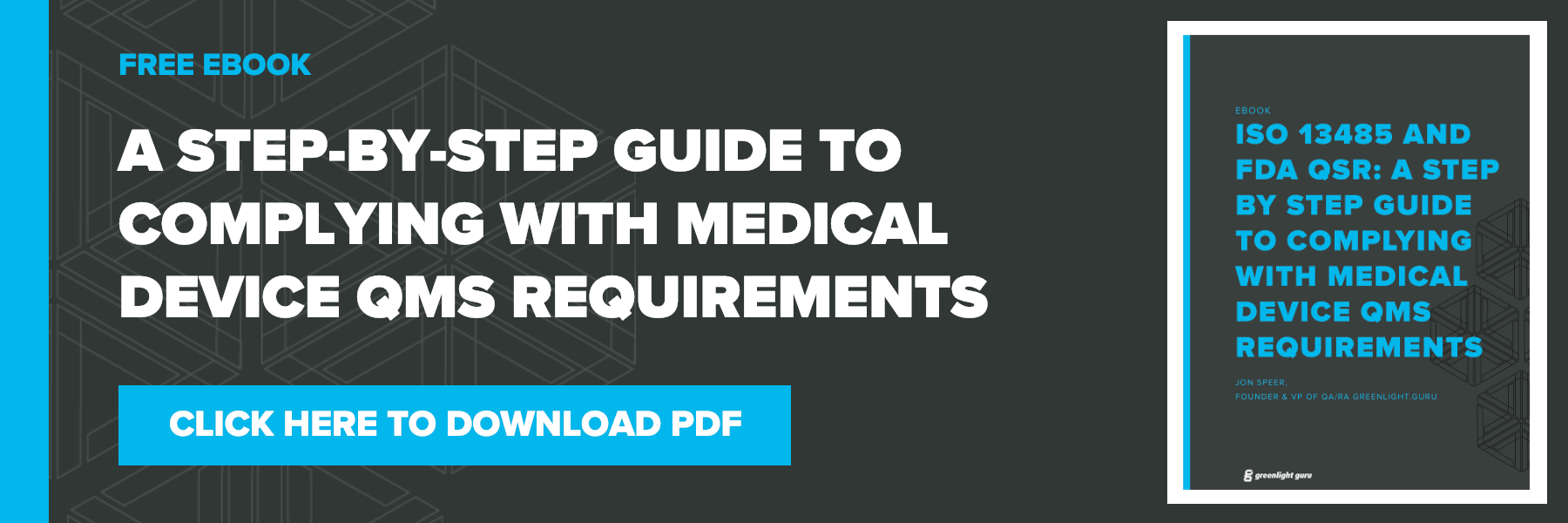Why Contract Manufacturers Shouldn't Own Your Quality System

Does your medical device company use a third-party or contract manufacturer?
This is a common situation in order to take advantage of existing infrastructure. Building the vertical infrastructure of a medical device business is necessary, but labor-intensive. It can also be very costly, so oftentimes it works out better to go with the contract manufacturer.
Where many device manufacturers slip up is by leaning too heavily on contract manufacturers when it comes to their quality system. This may be in an attempt to save time and money, but it often ends up becoming false economizing.
You might save resources on the front end, but allowing them to own your quality system opens a company up to a wide range of business risks and liabilities.
Here’s why your third-party manufacturer shouldn't own your quality system:
Who is really responsible?
Here’s the first key mistake: assuming a contract manufacturer could handle all QMS needs for a medical device company. You might think that since the contractor will be handling all manufacturing issues in the development and production of a medical device, the QMS requirements should also be on them, right?
Wrong.
Many medical device companies have found out the hard way that they simply can’t leave quality management up to their contract manufacturer.
Why?
Because the company whose name is on the product bears the responsibility to have a compliant system. If your company name is on a medical device, you are known as the “legal manufacturer” in the eyes of regulatory agencies.
The law says that executive management in your company ultimately has responsibility for your quality system. Now consider this for a minute, since you are ultimately responsible from a legal standpoint, should you also be cautious about leaving regulatory compliance up to a third-party quality management system?
The important point of distinction you must know as it relates to risk, is that the contractor, who is not legally responsible for the product, doesn’t keep compliance where it should be.
As I stated above, regulatory agencies expect and require that a medical device company’s executive management be active, engaged participants in their own quality management system. The executives are the ones who sign their names, advocating for the device, stating that it has been manufactured to be compliant, safe and effective.
People in this high stakes role need to be constantly evaluating their system to ensure it is effective and functioning as intended. If a company outsources this high-risk responsibility to a contract manufacturer, how could that company possibly be taking their quality and/or compliance responsibilities seriously?
And that's just what an auditor will think, too.
Setting up for success with a contract manufacturer
No one wants to end up in the position where they’ve failed an audit or inspection because they assumed that compliance requirements would be taken care of by a contract manufacturer.
The process of achieving a successful working relationship with a third-party contractor can truly feel like a journey, a journey that begins before you even hire them.
First of all, companies selecting a contract manufacturer should make sure the contracting company is registered with the FDA as the contract manufacturer for the product. This is an absolute must under the law, yet there are far too many contract manufacturers working on projects who aren’t registered.
How can that be?
Many resist this step because the registration fees can cost thousands of dollars, and registration opens them up to audits and inspections. If they’re not registered, they’re not only opening up themselves to noncompliance with the requirements, but also you company.
General rule of thumb: Quality should be your primary screening tool for a contract manufacturer and the right ones are willing to register.
In terms of finding a good contract manufacturer, here are a few basic principles we think they should exhibit:
- They have reasonable customer response time.
- For example, when you request a quote or have a query, do they get back to you within 24 - 48 hours?
- They communicate about any problems quickly too.
- You don’t want unnecessary delays to production.
- Has someone else worked with them? Did someone you know refer them? Have you seen the part?
- You should always be looking for proof in the part first (often referred to as a "first article"), unless they have come highly recommended by someone you know and trust. Look for reviews online from other reputable sources if you don’t have a direct connection.
Once you’ve found a manufacturer you’re happy with and you’ve checked out their references and performance history, you should set up a comprehensive outsourcing agreement. In relation to quality and compliance, you want to be absolutely sure that you get all the necessary documentation from your contractor. This will also cover your bases in case an FDA agent shows up knocking at your door.
Consider asking yourself the following questions as they relate to your company's relationship with a contract manufacturer:
- Do you do routine audits of the contract manufacturer?
- Have you visited their facilities?
- Do they let you know of any audit results they’ve had?
- Are they doing a management review with you?
- How are they handling product issues, such as non-conformances?
- Are they getting your approval before making changes to your devices?
All of these things should be part of an executed agreement between your company and the manufacturer. And in an ideal world, you will want to work as closely as possible with the manufacturer in terms of staying on top of quality issues.
In fact, syncing up the manufacturer you've hired, with your quality management system can be a great way to have open accountability and keep everyone in the loop who's involved in the process.
An industry specific QMS software, such as Greenlight Guru, is designed with all of this in mind. With FDA/ISO guidelines built into workflows within the cloud-based platform, companies can achieve end to end traceability, automate and track activity, and improve the quality of your processes throughout the product lifecycle.
Final thoughts
If it's your company's name on the medical device you're bringing to market, then it is ultimately your company that is legally responsible for your quality system. Will you put your business in the hands of a third party and hope they care as much about your company’s compliance as you do?
Hiring a contract manufacturer can provide a cost-effective way to develop devices, but you need to be involved in every step of the process. Maintain your own records and ensure everything is synced with your quality management system. Anything less is an unacceptable risk. I wouldn’t jeopardize my business by relinquishing control to a third-party entity, and you shouldn’t either.
Jon Speer is a medical device expert with over 20 years of industry experience. Jon knows the best medical device companies in the world use quality as an accelerator. That's why he created Greenlight Guru to help companies move beyond compliance to True Quality.




